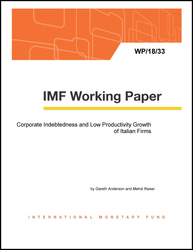
Corporate Indebtedness and Low Productivity Growth of Italian Firms
Productivity growth in Italy has been persistently anemic and has lagged that of the euro area over
the period 1999-2015, while the indebtedness of its corporate sector has increased. Using the ORBIS
firm-level database, this paper studies the long-term impact of persistent corporate-debt accumulation
on the productivity growth of Italian firms and investigates whether total factor productivity growth
varies with the level of corporate indebtedness. We employ a novel estimation technique proposed by
Chudik, Mohaddes, Pesaran, and Raissi (2017) to account for dynamics, bi-directional feedback
effects, cross-firm heterogeneity, and cross-sectional dependence arising from unobserved common
factors (for example, oil price shocks, labor and product market frictions, and stance of global
financial cycle). Filtering out the effects of unobserved common factors and controlling for firmspecific
characteristics, we find significant negative effects of persistent corporate debt build-up on
total factor productivity growth, and weak evidence of a threshold level of corporate debt, beyond
which productivity growth drops off significantly. Our results have strong policy implications, for
example the design of the tax system should discourage persistent corporate debt accumulation,
and effective and timely frameworks to reduce corporate debt overhangs are essential.
Publication date: February 2018
ISBN: 9781484343265
$18.00
Add to Cart by clicking price of the language and format you'd like to purchase
Available Languages and Formats
| English |
Prices in red indicate formats that are not yet available but are forthcoming.
Topics covered in this book
This title contains information about the following subjects.
Click on a subject if you would like to see other titles with the same subjects.
dynamic heterogeneous panel threshold models , cross-sectional dependence , Models with Panel Data , Firm Behavior: Empirical Analysis , General
Summary
Copyright © 2010 - 2024
Powered by:
AIDC



